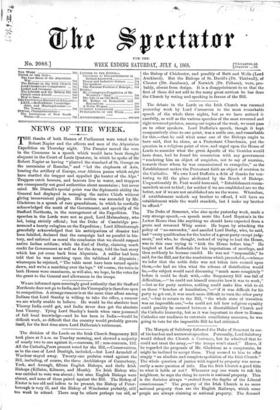The Duke of Somerset, who also spoke yesterday week, made
a very strange speech,—a speech more like Lord Royston's in the Lower House than like anything we should have expected from a grave and reverend Whig senior. He began by attacking the policy of "no-surrender," and assailed Lord Derby, who, he said, had "every qualification for the leader of a great party except judg- ment," and who, he thought, instead of trying to lead the House, was in this case trying to "kick the House before him." He laughed at Lord Redesdale for his imputations of sacrilege, and then suddenly he became candid. He was not "responsible," he said, for the Bill, nor for the resolutions which preceded it,—w hence we infer that the noble duke was not taken into council upon them,—he had no idea what the scheme of distribution would be,—the subject would need discussing "much more completely" before it could be dealt with,—the Suspensory Bill was full of difficulties,—" he could not himself conceive how it was to work," —but as for party motives, nothing could make him wish to sit on those "benches of humiliation,"—" if it was difficult for his party to get out, it was much more difficult to turn the other party out,"—but to return to the Bill, "the whole state of transition was an impossible one,"—he could not tell how religious equality could possibly be ensured between a disestablished Church and the Catholic hierarchy, but as it was important to show to Roman Catholics our readiness to entertain conciliatory measures, he was going to vote for the impossible Bill he had criticized.






























